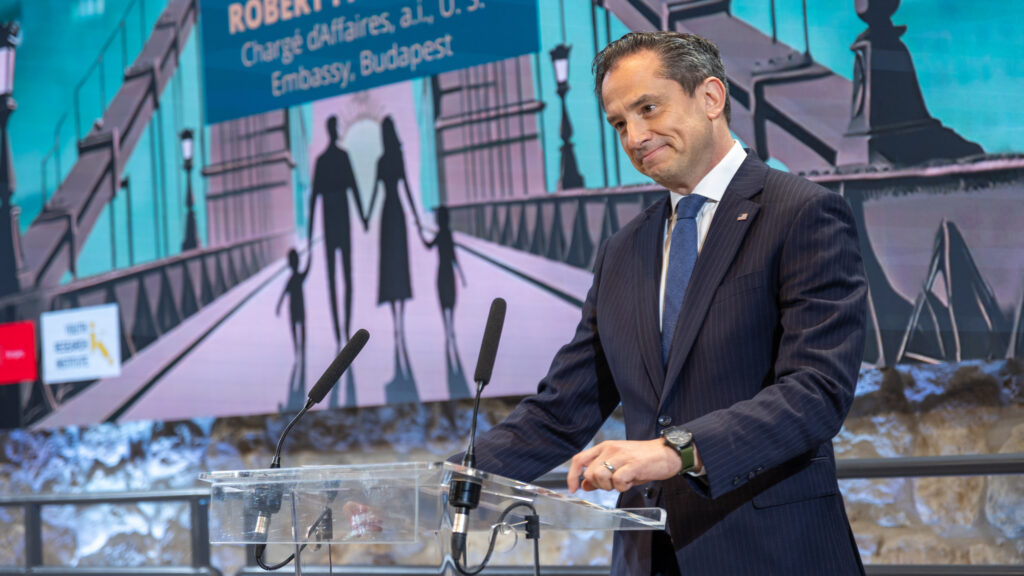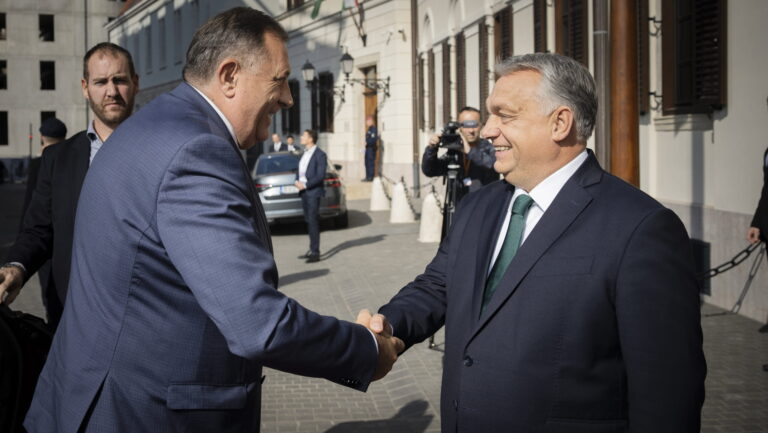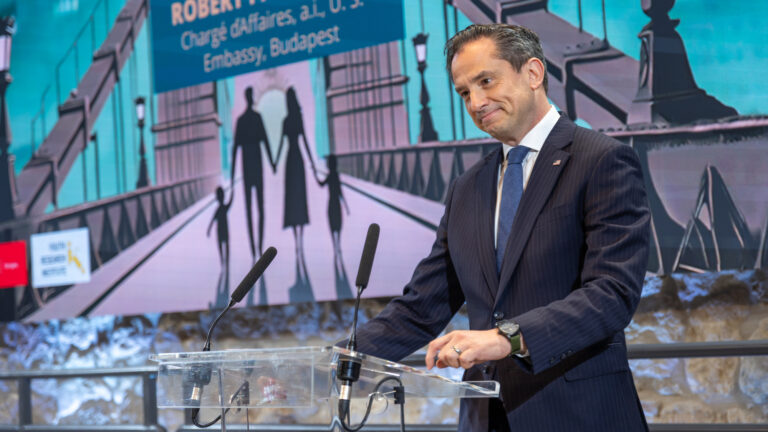This article was published in Vol. 3 No. 1 of the print edition.
The payment of EU funds allocated to Hungary in the 2021–2027 budget cycle was suspended in December 2022. The suspension, however, does not mean a loss of resources. In other words, the path is clear for Hungary: defying the political headwind, it can set a model for the EU as a whole, as to how its financial interests can be protected by means of the rule of law.
On 12 December 2022, the ambassadors of the EU member states recommended to the European Council the adoption of an executive decision regarding Hungary, based on the regulation on the rule of law conditionality mechanism.1 According to the official communication from Brussels, this legislation is a tool that serves to protect the EU budget and the financial interests of the European Union.2 Furthermore, the rule of law conditionality mechanism can be considered an EU-level solution for a complex dilemma: is it possible to give specific content and attach sanctions to a concept lacking essential clarity in this regard?
Pursuant to the decision, EU funds for Hungary, amounting to 6.3 billion euros in total, were suspended. This will remain the case until Hungarian public law bodies implement certain measures to protect the EU budget, with guarantees in line with the appropriate rule of law standards. In practice, these measures should affect the areas of public procurement, prosecution proceedings, and the fight against corruption.
The measures in question are undoubtedly useful—if only because they can serve as a model for the entire EU. However, the political framework surrounding the developments casts a shadow over the ongoing dialogue, making pathfinding more difficult.
The Narrative of Hungary as the ‘Black Sheep’ Among Member States
Hungary has been put in the pillory—both at the political level and in the media. The country is now widely seen as being ruled by a so-called ‘hybrid regime’3 where EU funds are not safe. However, the official records of the European Commission show otherwise. From the data of the EU Justice Scoreboard4 monitoring the efficiency of the judiciary, and the Single Market Scoreboard5 dealing with the operation of the EU market in the member states, it can be concluded that Hungary performs at or above average, even according to the European Commission.
‘These facts are pushed into the background in the noise surrounding the situation of the rule of law in Hungary’
According to the official statistics for the procurement of EU funds (Cohesion Data),6 Hungary is rated the third best concerning the drawing on EU funds in the previous budget term. If this is the case, it testifies not only to the fast but also to the regular spending of the money. However, these facts are pushed into the background in the noise surrounding the situation of the rule of law in Hungary, significantly burdening the dialogue between the Hungarian government and the European Commission.
It appears that the European Commission may have designated our country to test how to fill such a vague, difficult-to-grasp concept as the rule of law with enforceable legal content. It should be noted that there are also many signs that other—typically Eastern and Central European—member states may follow the fate of our country. ‘EU Court to Rule on Budget Weapon Aimed at Poland, Hungary’—read the headline of the Luxembourg Times7 at the end of January 2022. It turned out to be true. On 16 February, the European Court of Justice based in Luxembourg rejected the claim of Poland and Hungary,8 and at the same time gave the green light to the European Commission by stating that the rule of law conditionality regulation was in line with EU law.
From the moment that judgement was delivered, speculations about the due date of the ‘live test’ began. ‘Some sources in Brussels’ envisioned the initiation of the mechanism taking place during the period immediately following the announcement of the judgement.9 Instead, Ursula von der Leyen, president of the European Commission, waited until the publication of the results of the Hungarian parliamentary elections of 3 April and announced10 on 5 April that the Commission was launching the conditionality mechanism.
Intensive Negotiations Between the Hungarian Government and the Staff of the European Commission
Intensive negotiations began between the Hungarian government and the Brussels bureaucracy. As a result of the series of negotiations, an agreement was reached regarding a seventeen-point package of measures to be introduced in Hungary. The list focuses on increasing the efficiency of institutional action against corruption, in addition to the implementation of several other guarantees, such as ones concerning the criminal procedure and the legislation process of the Hungarian Parliament.
Regarding these, Johannes Hahn, Commissioner for Budget and Administration of the European Commission, reported at a press conference in September that domestic legislative amendments are, in principle, suitable for dealing with the concerns related to Hungary. On the same day, 18 September, the European Commission made a proposal to the Council of the European Union regarding the suspension of 65 per cent of the commitments.11 Among other things, this proposal applied to operational programmes within the framework of the cohesion policy.
In response, the Hungarian government undertook to fully inform the European Commission of the milestones for the implementation of the seventeen points by 19 November. The report was duly sent to the Commission, and Commissioner for Justice Didier Reynders reported to the European Parliament that the Commission was evaluating progress. After that, the Commission ‘passed the ball’ to the ministers of the EU member states, enabling the Council of the European Union to decide on the matter.
Unclear Legal Basis
Huge sums of money are being withheld from Hungary, but the legal basis for this is unclear. It is obvious on the part of the European Commission that it refers to the provisions of the rule-of-law conditionality regulation12 that entered into force two years ago. However, this also states, among other things, that the payment of the money can only be suspended if the relevant European Council decision is delivered.
The situation is even more confusing in the case of the reconstruction fund created after the coronavirus pandemic: Hungary submitted its national recovery plan in May 2021, without delay.13 It is worth noting that although there are member states that submitted their plans before Hungary, the plans of quite a few EU countries arrived in Brussels after the Hungarian document. Upon receipt of the plan, a couple of months should normally have sufficed for the EU and the Hungarian government to discuss the plan.14 Instead, the national plan ended up in the EU commissioners’ drawer and stayed there for years. Therefore, it can be concluded that the sanctions of the rule of law conditionality mechanism have been applied to Hungary without a separate decision.
It should be noted that there is still no explanation for Poland’s situation. The recovery plan of Warsaw was approved by the European Commission and the Council of the European Union,15 and no conditionality procedure has been initiated against Poland so far. This means that Poland could reasonably have expected payments from Brussels, which are being delayed on purely political grounds.
How Did We Get Here?
Looking back at the years following 2013, one could have foreseen that Hungary would one day come into open conflict with the EU institutions over the rule of law. However, when the Tavares report was adopted, the European Union took a different stance. In stark contrast to its role today, the European Commission still wanted to act as a ‘guardian of the treaties’ at that time, and interpreted its own action in this spirit, meaning that the body wanted to remedy the concerns expressed in the Tavares report16 by taking into account legal and professional arguments.
However, Jean-Claude Juncker, as Commission President, urged a radical change. He believed that the European Commission could also try its hand at EU party politics.17 As a result of this consideration, the so-called spitzenkandidat, i.e. top candidate system was created (right before Juncker’s election as top candidate).18 Essentially this means that the key actors of the Commission are now elected by the European Parliament. However, this goes hand in hand with the fact that the actions and behaviour of the commissioners are also politically motivated. This development makes the officials of the European Commission extremely vulnerable to pressure from the European Parliament. The latter has been operating with essentially the same powers since the Lisbon Treaty came into force over a decade ago. Examining the actual political influence of the EP, however, it can be said that the 2010s in particular were decisive in terms of the evolution of the nature of the institution.19

All of this led to Judith Sargentini’s 2018 report,20 of disputed validity.21 Although the two reports were of equal weight, the significance of the Sargentini report had more far-reaching consequences than the Tavares report. As a result, a procedural course of action known as the ‘Article Seven’ procedure was launched22 against Hungary, which theoretically could have resulted in the suspension of the right to vote in the EU Council of the targeted member state. The suspension can only be decided by the European Council, which operates according to the rules of diplomacy.
Since then, no such decision has been reached in the Council against Hungary (and in light of the lessons of past years, it may never be reached). However, this circumstance did not dissuade some politicians in the European Parliament from seeing the alleged threat to the functioning of the rule of law in Hungary as a fait accompli.
Thank You, Ms Delbos-Corfield!
However, it seems that the pressure has been successful, at least in part: ‘Hungary can no longer be considered a full democracy’,23 read the first lines of the EP decision that the body passed in mid-September 2022, following the release of Gwendoline Delbos-Corfield’s report. This radical statement, devoid of any professional impartiality, was formulated in order to deter the European Commission from negotiating with the Hungarian government.
What is more, the timing was certainly no coincidence: the decision came when the negotiations between the Hungarian government and the European Commission had reached a critical stage. The misconstruals and half-truths listed in the report were like oil poured on fire, and the European Parliament, clinging to them, finally demanded by an overwhelming majority that the European Commission condemn Hungary.
Greens MEP Daniel Freund provided some behind-the-scenes insights into the workings of the European Parliament. In his interview with Mandiner,24 the German politician, who follows Hungarian political developments with a microscope, denied that he would ‘obsessively’ be going after the Hungarian government. However, he revealed that he had played a non-negligible role in the initiation of the conditionality mechanism against Hungary. He even deplored the fact that the European Commission was negotiating with the Hungarian side at all. He admitted, however, that there were other EU member states—including his own country—where the rule of law suffers from serious deficiencies. He still insisted that the Hungarian government should be taught a lesson and be made an example of for the EU as a whole. He also said that Poland could be the next target.
Autumn of ’22 and the Winds of Change
Starting from the beginning of autumn, several analyses stated that the EU payments to Hungary could be given the green light when the problems surrounding the payments are released from the ‘Bermuda Triangle’ bordered by the rule of law conditionality mechanism, the blocked Hungarian recovery plan, and the partnership agreement. The latter two can be considered ‘prisoners’ of the former. Although these issues are not organically related to each other, they can only be resolved if the conditionality mechanism is abolished in relation to Hungary.
By the end of 2022, the picture seemed to be becoming clearer. At a press conference held on the last day of November, Hungary and the European Union came closer to learning what conditions must be met in order to acknowledge that EU funds are being used transparently in a member state. On behalf of the European Commission, Didier Reynders, Johannes Hahn, and Valdis Dombrovskis presented25 to the public the Commission’s evaluation26 of the plan27 that Hungary put on the table within the framework of the European Recovery and Resilience Facility (RRF) after a consultation lasting several years.
‘Huge sums of money are being withheld from Hungary, but the legal basis for this is unclear’
The Hungarian Recovery and Resilience Building Plan (RRP) includes reforms and investments worth 5.8 billion euros, representing 3.8 per cent of Hungary’s GDP in 2021.28 The primary goal of the RRF is to counterbalance the economic and social effects of the coronavirus pandemic, but at the same time, member states’ plans include, among other things, measures to enhance the crisis-resistant abilities of their economies, as well as to carry out the green and digital transitions.
The European Commission found the Hungarian plan excellent and recommended it to the Council of the European Union for adoption. The plan aims to implement eleven criteria (such as economic growth and job creation, as well as the green transition and digital progress). Hungary received the highest ‘A’ rating for ten of the eleven criteria. One criterion received a ‘B’ rating, but nor did any other member state get an ‘A’ for this criterion. It turned out to be politically logical for the Commission, interested in easing its conflict with the European Parliament, to continue to recommend the partial suspension of payments for the three operational programmes most closely related to the issue of public procurement—just as it had done earlier, in September. On the other hand, since the Commission’s official communication and the regulation on the conditionality mechanism refer to a suspension, not a withdrawal, the amount is not lost. Hungary can obtain it in the later phase of the budget cycle.
As for the conditionality mechanism, the dynamics of the negotiations and the surrounding press coverage lead us to conclude that a kind of ‘monitoring’, i.e. impact assessment, will remain with us this year as well. Given that some Hungarian legislative amendments will enter into force in March 2023, it seems obvious that the European Commission and the Council of the European Union should take up Hungary’s case again.
Hungary Needs the Funds and Is Willing to Cooperate with the EU
The economic growth of recent years does not mean that Hungary—like other EU member states also affected by the pandemic—would not benefit from EU funds. As the European Commission admits,29 the Hungarian economy has caught up with the EU average; however, significant reforms are needed to ensure further sustainable growth.
This would be the case in education, for instance, as well as many other fields. The Hungarian RRP also deals in detail with increasing the attractiveness of the teaching profession, to be promoted by a continuous increase in teachers’ wages. As part of this, the government undertook, among other things, to raise the average salary of teachers working in the public education system from 59 per cent to at least 80 percent of the average salary of those with higher education qualifications. If the agreement with the European Commission is reached, teachers could receive a salary increase of unprecedented size—as has been constantly communicated at press conferences organized by the Hungarian government.
Furthermore, the Hungarian RRP contains a number of measures designed to strengthen the anti-corruption framework, as well as guarantee mechanisms for the prevention, detection, and sanctioning of fraud, corruption, conflicts of interest, and other risks related to the use of EU subsidies in Hungary.
In the spirit of the above aspirations, the Anti-Corruption Working Group is being established with the close involvement of, among others, the Integrity Authority and NGOs (for example, Transparency International or the K-Monitor Public Benefit Society). The task of the latter is to examine the existing anti-corruption measures and develop proposals for the detection of corruption and other similar phenomena (nepotism, favouritism, and the ‘revolving door phenomenon’ between public and private sectors). As a result of these amendments, cooperation between the Hungarian authorities and the European Anti-Fraud Office (OLAF) will also be strengthened; for example, the latter will receive reinforcements from the National Tax and Customs Administration (NAV).
The rule of law reform package is one of the cornerstones of the Hungarian RRP. Within this framework, existing practices must undergo structural improvement. This package of measures, which can logically be considered an ‘odd one out’, includes, among other things, essential criminal procedure reform, through which proceedings can be initiated in the event that corruption is suspected, even if the public prosecutor’s office would otherwise consider the case closed.
The structural reforms also entail a significant strengthening of the role and powers of the National Judicial Council (OBT) and the operation of the Hungarian Supreme Court (Kúria). In the case of the former, the guiding principle is that the reformed OBT counterbalances the powers of the president of the National Office for the Judiciary (OBH). The fact that it can enjoy budgetary autonomy in the future can be considered a significant guarantee of the OBT’s independence.
Another amendment concerning the operation of the Court and the OBT is brought about by the decision that in the future, the president of the Court can only be a jurist with at least five years of judicial experience, and the possibility of re-election will be suppressed. Also, the importance of the OBT is increased by the fact that it must issue a reasoned, binding opinion on the suitability of the candidates for president and vice president of the Supreme Court. Furthermore, the possibility for the authorities to challenge final court decisions before the Constitutional Court will no longer exist.
Spring of 2023 May Clear the Path to the Suspended Funds
It is now certain that the search for a route forward will be successful if two conditions are met. First, Hungary will receive the respective funds if it modifies the legal environment for the distribution of EU funds. Second, the Brussels bureaucracy will consider the measures appropriate if they result in the enforcement of the principles of the rule of law at all levels of EU funding distribution.
‘A major partial result […] was that the European Commission approved the disbursement of about four thousand billion forints’
We can reasonably assume that the dialogue between the Hungarian government and the European Commission has been particularly constructive. A major partial result of the autumn negotiations was that the European Commission approved the disbursement of about four thousand billion forints to be used for agricultural and rural development purposes,30 and declared that the financing could start immediately. This positive sign is further confirmed by the favourable rating of the Hungarian RRP by the Commission.
All in all, it can be said that 2022 was spent pathfinding—not only in the geopolitical sense, but also in relation to that now familiar technical term, the rule of law. Although the concept is still difficult to grasp, it has developed in such a way that it is being filled with specific content right before our eyes.
NOTES
1 Council of the EU, ‘Rule of Law Conditionality Mechanism: Council Decides to Suspend €6.3 Billion Given Only Partial Remedial Action by Hungary’, Press Release, www.consilium.europa.eu/en/press/press-releases/2022/12/12/rule-of-law-conditionality-mechanism/, accessed 12 January 2023.
2 European Commission, ‘Rule of Law Mechanism’, https://commission.europa.eu/strategy-and-policy/policies/justice-and-fundamental-rights/upholding-rule-law/rule-law/rule-law-mechanism_en, accessed 12 January 2023.
3 For example: András Bozóki and Dániel Hegedűs, ‘An Externally Constrained Hybrid Regime: Hungary in the European Union’, Democratization, 25/7 (2018), 1173–1189, doi: 10.1080/13510347.2018.1455664; Eszter Zalán, ‘Hungary Turned into “Hybrid Regime”, MEPs Say’, EUObserver, https://euobserver.com/rule-of-law/154920, accessed 23 January 2023.
4 European Commission, ‘EU Justice Scoreboard’, https://commission.europa.eu/strategy-and-policy/policies/ justice-and-fundamental-rights/upholding-rule-law/eu-justice-scoreboard_en, accessed 12 January 2023.
5 European Commission, ‘The Single Market Scoreboard’, https://single-market-scoreboard.ec.europa.eu/, accessed 12 January 2023.
6 European Commission, ‘Cohesion Open Data Platform’, https://cohesiondata.ec.europa.eu/, accessed 12 January 2023.
7 ‘EU Court to Rule on Budget Weapon Aimed at Poland, Hungary’, Luxembourg Times, www.luxtimes.lu/en/european-union/eu-court-to-rule-on-budget-weapon-aimed-at-poland-hungary-61f0096ede135b9236f6446c, accessed 12 January 2023.
8 ‘Judgements of the Court of Justice of the European Union in Cases C-156/21 Hungary v Parliament and Council, and C-157/21 Poland v Parliament and Council’, curia.europa.eu, https://curia.europa.eu/jcms/jcms/j_6/en/, accessed 12 January 2023.
9 ‘Top Court Clears EU to Cut Funds over Rule-of-law Concerns’, Politico, www.politico.eu/article/eu-court-greenlights-brussels-power-to-cut-funds-over-rule-of-law-concerns/, accessed 12 January 2023.
10 ‘EU Launches Process to Slash Hungary’s Funds over Rule-of-law Breaches’, Politico, www.politico.eu/article/eu-commission-to-trigger-rule-of-law-budget- tool-against-hungary/, accessed 12 January 2023.
11 European Commission, ‘EU Budget: Commission Proposes Measures to the Council under the Conditionality Regulation’, ec.europa.eu, https://ec.europa.eu/commission/presscorner/detail/en/IP_22_5623, accessed 12 January 2023.
12 Regulation (EU, Euratom) 2020/2092 of the European Parliament and of the Council of 16 December 2020 on a general regime of conditionality for the protection of the Union budget.
13 European Commission, ‘Recovery and Resilience Facility: Hungary Submits Official Recovery and Resilience Plan’, ec.europa.eu, https://ec.europa.eu/commission/presscorner/detail/en/ip_21_2442, assessed 12 January 2023.
14 Article 19 of Regulation (EU) 2021/241 of the European Parliament and of the Council of 12 February 2021 establishing the Recovery and Resilience Facility.
15 European Council, ‘NextGenerationEU: Ministers Approve the Assessment of Poland’s National Plan by the European Commission’, consilium.europa.eu, www.consilium.europa.eu/en/press/press-releases/2022/06/17/recovery-fund-ministers-welcome-assessment-of-poland-s-national-plan/, accessed 12 January 2023.
16 European Parliament, ‘Report on the Situation of Fundamental Rights: Standards and Practices in Hungary (pursuant to the European Parliament resolution of 16 February 2012)’, europarl.europa.eu, www.europarl.europa.eu/doceo/document/A-7-2013-0229_EN.html, accessed 12 January 2023.
17 Robert Stüwe, Thomas Panayotopoulos, Sanni Kunnas, and Henri de Waele, The Juncker Commission. Politicizing EU Policies (Nomos Publishing House, 2020), doi: 10.5771/9783845297736-1, accessed 12 January 2023; also see, Neill Nugent and Mark Rhinard, ‘The “Political” Roles of the European Commission’, Journal of European Integration, 41 (2019), 1–18, doi: 10.1080/07036337.2019.1572135.
18 European Parliament, ‘Role and Election of the President of the European Commission’, europarl.europa.eu, www.europarl.europa.eu/thinktank/en/document/EPRS_BRI(2019)637983, accessed 12 January 2023.
19 Karl Magnus Johansson and Tapio Raunio, ‘Shaping the EU’s Future? Europarties, European Parliament’s Political Groups and the Conference on the Future of Europe’, in Petra Ahrens, Anna Elomäki, and Johanna Kantola, eds, European Parliament’s Political Groups in Turbulent Times, Palgrave Studies in European Union Politics (Palgrave Macmillan, 2022), doi: 10.1007/978-3-030-94012-6_8.
20 European Parliament, ‘Report on a Proposal Calling on the Council to Determine, Pursuant to Article 7(1) of the Treaty on European Union, the Existence of a Clear Risk of a Serious Breach by Hungary of the Values on Which the Union Is Founded’, europarl.europa.eu, www.europarl.europa.eu/doceo/document/A-8-2018-0250_EN.html, accessed 12 January 2023.
21 ‘Judgment of the Court (Grand Chamber) in Case C-650/18, an Action for Annulment under Article 263 TFEU, Brought on 17 October 2018’, curia.europa.eu, https://curia.europa.eu/juris/document/document.jsf;jsessionid=C1CE8321242B475449CA91DFD74F8A22?text=&docid=242030&pageIndex=0&doclang=EN& mode=lst&dir=&occ=first&part=1&cid=71811, accessed 12 January 2023.
22 European Parliament, ‘European Parliament Resolution of 12 September 2018 on a Proposal Calling on the Council to Determine, Pursuant to Article 7(1) of the Treaty on European Union, the Existence of a Clear Risk of a Serious Breach by Hungary of the Values on Which the Union Is Founded’, europarl.europa.eu, www.europarl.europa.eu/doceo/document/TA-8-2018-0340_EN.html, accessed 12 January 2023.
23 European Parliament, ‘MEPs: Hungary Can No Longer Be Considered a Full Democracy’, europarl.europa.eu, www.europarl.europa.eu/news/en/press-room/20220909IPR40137/meps-hungary-can-no-longer-be-considered-a-full-democracy, accessed 12 January 2023.
24 Gergely Dobozi, ‘Aggodalommal tölti el Daniel Freundot az Európai Bizottság és a magyar kormány megállapodása’ (The Agreement between the European Commission and the Hungarian Government Gives Rise to Worries for Daniel Freund), Mandiner (11 October 2022), https://mandiner.hu/cikk/20221011_daniel_freund_jogallamisag_orban_kormany_interju, accessed 12 January 2023.
25 European Commission, ‘Remarks by Executive Vice-President Dombrovskis, Commissioner Hahn and Commissioner Reynders at the Press Conference on Hungary’s Recovery and Resilience Plan and on the Application of the Rule of Law Conditionality Regulation’, ec.europa.eu, https://ec.europa.eu/commission/presscorner/detail/en/statement_22_7318, 12 January 2023.
26 European Commission, ‘Proposal for a Council Implementing Decision on the Approval of the Assessment of the Recovery and Resilience Plan for Hungary’, commission.europa.eu, https://commission.europa.eu/system/files/2022-12/COM_2022_686_1_ EN.pdf, accessed 12 January 2023.
27 Hungarian Government, ‘Hungary’s Recovery and Resilience Plan’, www.palyazat.gov.hu/download.php?objectId=1096565, accessed 12 January 2023.
28 European Commission, ‘Commission Staff Working Document Analysis of the Recovery and Resilience Plan of Hungary Accompanying the Document Proposal for a Council Implementing Decision on the Approval of the Assessment of the Recovery and Resilience Plan for Hungary’, commission.europa.eu, https://commission.europa.eu/system/files/2022-12/SWD_2022_686_2_EN.pdf, accessed 12 January 2023.
29 European Commission, ‘Commission Staff Working Document’.
30 European Commission, ‘The Commission Approves the CAP Strategic Plan for Hungary’, agriculture.ec.europa.eu, https://agriculture.ec.europa.eu/news/commission-approves-cap-strategic-plan-hungary-2022-11-07_en, accessed 12 January 2023.








